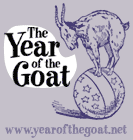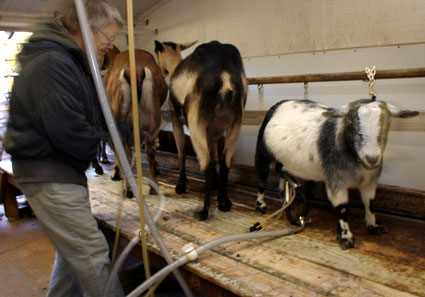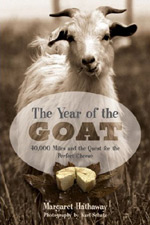This visit, we didn't get a chance to see the cheese making process, but we did have the opportunity to witness our first commercial milking. We arrived early on Monday morning to watch the does being led in groups into the milking parlor, where a system of vacuum pumps sucks milk from their teats through a glass tube, a filtration system, and finally into a cooling tank. From there, the milk is either bottled and sold or pasteurized and made into cheese.
We had only seen animals being milked by hand, never by machine, and it was fascinating not only to watch the system in action, with foamy white milk shooting through its transparent tubes, but also to see how much human contact is still involved in the milking. When the does are led onto the milking platform, their udders are still "stripped" by hand, meaning that the first squirt of milk is squeezed by someone's fingers rather than the pump. The suction pumps are attached and removed manually, and when they are finished, the teats are all sterilized by hand. Over the noise of the pump, Evin and Maggie, the assistant farm manager, talk to the goats, while scratching their ears and shoulders. Each doe has her own habits and personality, and the women know them all, their rhythms and their tricks. Though we were expecting the machine to take all of the intimacy out of milking, it actually still seemed like a very personal time with the goats. Maybe it was the hour, or the breaking light, but in spite of the noise and the bustle and all of the work, milking felt to us like an attractive way to open the day.
In fact, many of the things we've found appealing about farming — like the sense of a day's orderly beginning — were in evidence at Split Creek. There was a distinct structure to the farm: the animals' welfare was the top priority, and everything was well kept and seemed to be on the right scale for the land. It is clearly a farm into which a lot of hard work and a lot of careful decision making have gone.
In addition to its other virtues, Split Creek is the first farm we've visited that supports itself; while Pat also has her career as an artist, Evin is a full time farmer. Having met so many people who struggle to balance the demands of their farms with other full time occupations, we found this really impressive.
An irony is that when Evin first wanted to farm, she was told, as she puts it, that she would need "to marry it or bury it." When she studied animal science at Clemson University, she was the only woman in the program, and became the first female graduate in that field. Since then, she has excelled as a farmer, and has become widely respected for the quality of her animals, her feed program, and her herd management. Moreover, she and Pat are involved with Rancho Ebenezer, an international group that helps teach techniques of sustainable agriculture in Latin America, so they're working to spread their knowledge of farming to those for whom it truly could make a world of difference. —MMH


